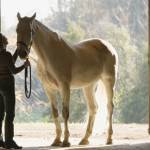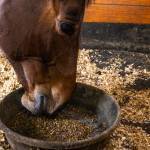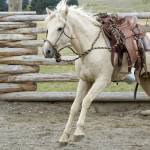Horse Nutrition Tips: Your Vet’s Wish List

Sure, you love horses, especially your horse, but could you be doing more to keep them fit and healthy? As many of us have learned along the way, there is more to horse ownership than providing feed, water, shelter, and unconditional love.
Here are four things that your vet wished you consistently did to maximize your horse’s health and longevity:
1. Have a full examination performed at least once a year, not just to administer recommended or risk-based vaccines, but also to identify issues that are easily overlooked.
“When you see your horse daily, often through rose-colored glasses, issues like dental care, appropriate trimming and shoeing, coat condition, and body weight abnormalities may go unnoticed. Catching these things early is beneficial for both the horse and the owner’s wallet,” notes Bryan M. Waldridge, D.V.M., head veterinarian for Kentucky Equine Research.
2. Recall that internal parasites can cause colic, weight loss, unthriftiness, poor hair coat, and diarrhea. Parasite control has changed over the years and routine rotational deworming programs may no longer be effective. Discuss options for fecal egg counts and targeted deworming with your vet.
“Parasites can damage the lining of the intestinal tract, which mount up over time with repeated insult. This could result in a decreased ability for horses to absorb nutrients, meaning that additional energy or a supplement may be required to keep them in good condition. That said, one study* did not find any difference in nutrient absorption between old and younger horses,” Waldridge advises.
3. Discuss any specific dietary needs your horse may have, request a consultation with an equine nutritionist, and consider hay analysis.
According to Waldridge, “The annual examination is a great time to discuss overall diet, sources of hay, hay alternatives, and any supplements your horse might need based on body condition score (BCS), age, and concurrent health problems,”
4. Learn how to accurately assess BCS and do so regularly. As easy as it sounds, BCS scoring is an art, requiring practice and dedication. Horses that are too thin or too fat are usually not in optimal health.
Waldridge adds, “Keep in mind that a healthy BCS gives you about 200-lb (approximately 90 kg) leeway because every point on the Henneke BCS scale is equivalent to about 50 lb (approximately 23 kg).”
Although not comprehensive, these four tips alone will contribute to solidifying the bond between you and your horse.
*S. Elzinga, B. Nielsen, J. McCutcheon, H. Schott, P. Harris, R. Geor, and J. Rapson. 2011. Effect of age on digestibility of various feedstuffs in horses. Journal of Equine Veterinary Science 31:268-269.








